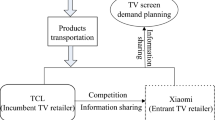Abstract
Currently, highly complex supply networks are vulnerable to various kinds of disruptions, which may greatly affect the operational efficiency of supply chains. This calls for the development of management approaches to build a resilient supply chain under disruptions. In this work, we are mainly interested in transportation disruptions that affect shipments along a supply chain and study the decision problem of suppliers in regards to acquiring and sharing transportation disruption information in a competitive setting. In particular, we investigate a two-echelon supply chain consisting of one buyer and two competing suppliers where the buyer places an order for a single product with the two suppliers. During the product transportation process, a disruption may occur and damage the shipments in transit. In the face of such a transportation disruption, each supplier can either have its shipment inspected and reveal information to the buyer or continue without taking any action. We study this problem by formulating it as a non-cooperative game and derive equilibrium results for the two suppliers on whether or not to share information considering competition. We find that the timing and severity of the transportation disruption affect a supplier’s decision on whether to acquire and share private information. By adopting an incentive mechanism, the buyer can raise the probability that a supplier shares its information, which could eventually enhance the performance of the disrupted supply chain. The supplier in a stronger market position usually acts passively towards the disruption, while the competing supplier tends to use information sharing as a way to win market share from its competitor. In addition, a sensitivity analysis is conducted on some important parameters of our model to show the impact of information sharing on supply chain performance.










Similar content being viewed by others
References
Choi, T. M., Ma, C., Shen, B., & Sun, Q. (2019). Optimal pricing in mass customization supply chains with risk-averse agents and retail competition. Omega: The International Journal of Management Science, 88, 150–161.
Dong, C. W., Shen, B., Chow, P. S., Yang, L., & Ng, C. T. (2016). Sustainability investment under cap-and-trade regulation. Annals of Operations Research, 240(2), 509–531.
Dong, L., & Tomlin, B. (2012). Managing disruption risk: The interplay between operations and insurance. Management Science, 58, 1898–1915.
Hendricks, K. B., & Singhal, V. R. (2005). Association between supply chain glitches and operating performance. Management Science, 51, 695–711.
Hishamuddin, H., Sarker, R. A., & Essam, D. (2013). A recovery model for a two-echelon serial supply chain with consideration of transportation disruption. Computers & Industrial Engineering, 64, 552–561.
Huang, S., Guan, X., & Xiao, B. (2018). Incentive provision for demand information acquisition in a dual-channel supply chain. Transportation Research Part E, 116, 42–58.
Huang, S., & Yang, J. (2016). Information acquisition and transparency in a supply chain with asymmetric production cost information. International Journal of Production Economics, 182, 449–464.
Ivanov, D., Dolgui, A., Sokolov, B., & Ivanova, M. (2017). Literature review on disruption recovery in the supply chain. International Journal of Production Research, 55, 6158–6174.
Kumar, R. S., & Pugazhendhi, S. (2012). Information sharing in supply chains: An overview. Procedia Engineering, 38, 2147–2154.
Lai, X., Tao, Y., Wang, F., & Zou, Z. (2019). Sustainability investment in maritime supply chain with risk behavior and information sharing. International Journal of Production Economics, 218, 16–29.
Lee, H., So, K., & Tang, C. (2000). The value of information sharing in a two-level supply chain. Management Science, 46, 626–643.
Li, S., He, Y., & Chen, L. (2017). Dynamic strategies for supply disruptions in production-inventory systems. International Journal of Production Economics, 194, 88–101.
Li, T., Tong, S., & Zhang, H. (2014). Transparency of information acquisition in a supply chain. Manufacturing and Service Operations Management, 16(3), 412–424.
Li, G., Zhang, L., Guan, X., & Zheng, J. (2016). Impact of decision sequence on reliability enhancement with supply disruption risks. Transportation Research Part E: Logistics and Transportation Research, 90, 25–38.
Li, G., Zheng, H., Sethi, S. P., & Guan, X. (2018). Inducing downstream information sharing via manufacturer information acquisition and retailer subsidy. Decision Sciences. https://doi.org/10.1111/deci.12340.
Liu, C., Shu, T., Chen, S., Wang, S., Lai, K. K., & Gan, L. (2016). An improved grey neural network model for predicting transportation disruptions. Expert Systems with Applications, 45, 331–340.
Paul, S. K., Asian, S., Goh, M., & Torabi, S. A. (2017a). Managing sudden transportation disruptions in supply chains under delivery delay and quantity loss. Annals of Operations Research, 1, 1–32.
Paul, S. K., Sarker, R., & Essam, D. (2017b). A quantitative model for disruption mitigation in a supply chain. European Journal of Operational Research, 257, 881–895.
Saghafian, S., & Van Oyen, M. P. (2012). The value of flexible backup suppliers and disruption risk information: Newsvendor analysis with recourse. IIE Transactions, 44, 834–867.
Samvedi, A., & Jain, V. (2012). Effect of sharing forecast information on the performance of a supply chain experiencing disruptions. International Journal of Logistics Systems and Management, 13, 126–138.
Shen, B., & Chan, H. L. (2017). Forecast information sharing for managing supply chains in the big data era: Recent development and future research. Asia-Pacific Journal of Operational Research, 34(1), 1740001–1–1740001–26.
Shen, B., Choi, T. M., & Chan, H. L. (2019a). Selling green first or not? A Bayesian analysis with service levels and environmental impact considerations in the big data era. Technological Forecasting and Social Change, 144, 412–420.
Shen, B., Choi, T. M., & Minner, S. (2019b). A review on supply chain contracting with information considerations: Information updating and information asymmetry. International Journal of Production Research, 57, 4898–4936.
Shen, B., Xu, X., & Choi, T. M. (2019c). Simplicity is beauty: Pricing coordination in two-product supply chains with simplest contracts under voluntary compliance. International Journal of Production Research, 57(9), 2769–2787.
Shi, X., & Shen, B. (2019). Product upgrading or not: R&D tax credit, consumer switch and information updating. International Journal of Production Economics, 213, 13–22.
Shi, N., Zhou, S., Wang, F., Xu, S., & Xiong, S. (2014). Horizontal cooperation and information sharing between suppliers in the buyer–supplier triad. International Journal of Production Research, 52, 4526–4547.
Snyder, L. V., Atan, Z., Peng, P., Rong, Y., Schmitt, A. J., & Sinsoysal, B. (2016). OR/MS models for supply chain disruptions: A review. IIE Transactions, 48, 89–109.
Srivathsan, S., & Kamath, M. (2018). Understanding the value of upstream inventory information sharing in supply chain networks. Applied Mathematical Modelling, 54, 393–412.
Tao, Y., Lee, L. H., & Chew, E. P. (2016). Quantifying the effect of sharing information in a supply chain facing supply disruptions. Asia-Pacific Journal of Operational Research, 33, 1–29.
Tomlin, B. (2006). On the value of mitigation and contingency strategies for managing supply chain disruption risks. Management Science, 52, 639–657.
Wilson, M. C. (2007). The impact of transportation disruptions on supply chain performance. Transportation Research Part E: Logistics and Transportation Research, 43, 295–320.
Wu, J., Zhai, X., & Huang, Z. (2008). Incentives for information sharing in duopoly with capacity constraints. Omega: International Journal of Management Science, 36, 963–975.
Wu, J., Zhai, X., Zhang, C., & Liu, X. (2011). Sharing quality information in a dual-supplier network: A game theoretic perspective. International Journal of Production Research, 49, 199–214.
Yang, Z., Aydın, G., Babich, V., & Beil, D. R. (2008). Supply disruptions, asymmetric information, and a backup production option. Management Science, 55, 192–209.
Zhang, H., Nagarajan, M., & Sošic, G. (2010). Dynamic supplier contracts under asymmetric inventory information. Operations Research, 58(5), 1380–1397.
Zhang, C., Tan, G. W., Robb, D. J., & Zheng, X. (2006). Sharing shipment quantity information in the supply chain. Omega: International Journal of Management Science, 34, 427–438.
Zhong, Y., Shu, J., Xie, W., & Zhou, Y. (2018). Optimal trade credit and replenishment policies for supply chain network design. Omega: The International Journal of Management Science, 81, 26–37.
Acknowledgements
This research was partially funded by the National Natural Science Foundation of China (NSFC) under Grants 71431007, 71601054, 71701221, 71701222 and 71991461, the Natural Science Foundation of Guangdong Province under Grants 2016A030313719 and 2019A1515010492, Guangdong Province Soft Science Research Project under Grant 2019A101002074, Guangdong Province Universities and Colleges Pearl River Young Scholar Funded Scheme (2017), and the Ministry of Education in China (MOE) Project of Humanities and Social Sciences under Grant 17YJC630235.
Author information
Authors and Affiliations
Corresponding author
Additional information
Publisher's Note
Springer Nature remains neutral with regard to jurisdictional claims in published maps and institutional affiliations.
Rights and permissions
About this article
Cite this article
Tao, Y., Lai, X. & Zhou, S. Information sharing in a transparent supply chain with transportation disruptions and supplier competition. Ann Oper Res 329, 307–329 (2023). https://doi.org/10.1007/s10479-020-03724-3
Published:
Issue Date:
DOI: https://doi.org/10.1007/s10479-020-03724-3




